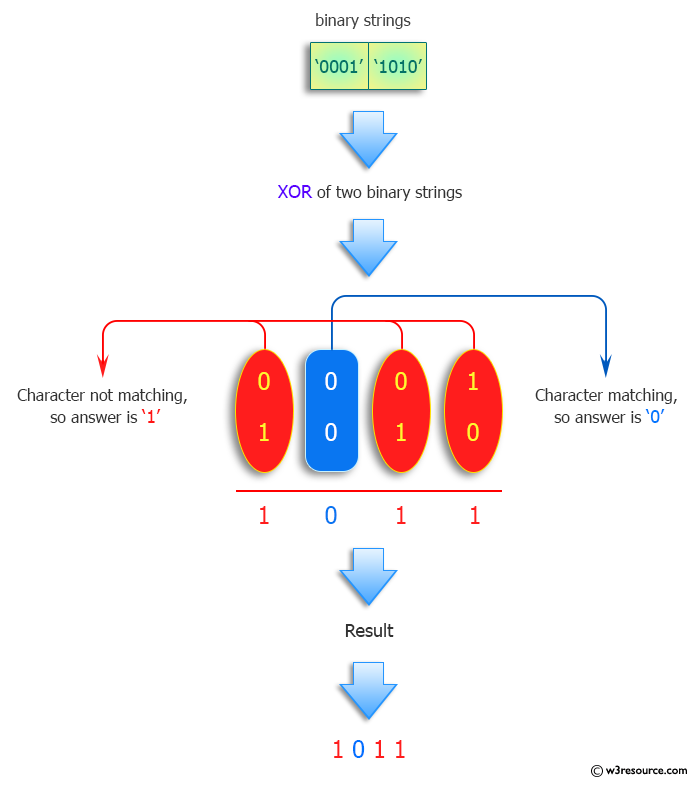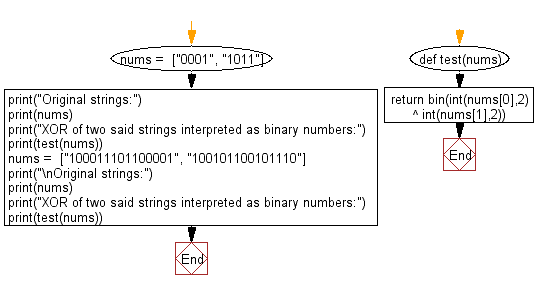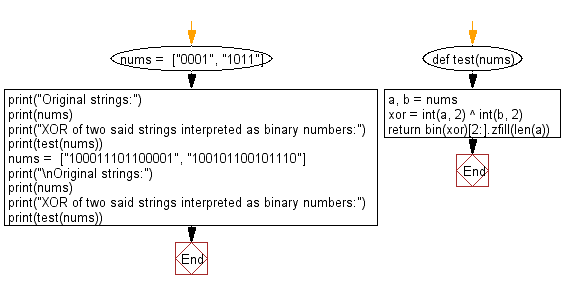Python: Find the XOR of two given strings interpreted as binary numbers
XOR of Binary Strings
Write a Python program to find the XOR of two given strings interpreted as binary numbers.
Note: XOR represents the inequality function, i.e., the output is true if the inputs are not alike otherwise the output is false. A way to remember XOR is "must have one or the other but not both". XOR can also be viewed as addition modulo 2. As a result, XOR gates are used to implement binary addition in computers.
Input: ['0001', '1011'] Output: 0b1010 Input: ['100011101100001', '100101100101110'] Output: 0b110001001111
Visual Presentation:

Sample Solution-1:
Python Code:
# License: https://bit.ly/3oLErEI
# Define a function named 'test' that takes a list of binary strings 'nums' as input
def test(nums):
# Use binary XOR (^) on the integers converted from the binary strings in the input list
# Convert the result back to a binary string
return bin(int(nums[0], 2) ^ int(nums[1], 2))
# Assign a specific list of binary strings 'nums' to the variable
nums = ["0001", "1011"]
# Print the original list of binary strings 'nums'
print("Original strings:")
print(nums)
# Print a message indicating the operation to be performed
print("XOR of two said strings interpreted as binary numbers:")
# Print the result of the test function applied to the 'nums' list
print(test(nums))
# Assign a different list of binary strings 'nums' to the variable
nums = ["100011101100001", "100101100101110"]
# Print the original list of binary strings 'nums'
print("\nOriginal strings:")
print(nums)
# Print a message indicating the operation to be performed
print("XOR of two said strings interpreted as binary numbers:")
# Print the result of the test function applied to the updated 'nums' list
print(test(nums))
Sample Output:
Original strings: ['0001', '1011'] XOR of two said strings interpreted as binary numbers: 0b1010 Original strings: ['100011101100001', '100101100101110'] XOR of two said strings interpreted as binary numbers: 0b110001001111
Flowchart:

Sample Solution-2:
Python Code:
# License: https://bit.ly/3oLErEI
# Define a function named 'test' that takes a list of binary strings 'nums' as input
def test(nums):
# Unpack the list 'nums' into two binary strings 'a' and 'b'
a, b = nums
# Use binary XOR (^) on the integers converted from the binary strings in the input list
xor = int(a, 2) ^ int(b, 2)
# Convert the result back to a binary string, ensuring it has the same length as the input strings
return bin(xor)[2:].zfill(len(a))
# Assign a specific list of binary strings 'nums' to the variable
nums = ["0001", "1011"]
# Print the original list of binary strings 'nums'
print("Original strings:")
print(nums)
# Print a message indicating the operation to be performed
print("XOR of two said strings interpreted as binary numbers:")
# Print the result of the test function applied to the 'nums' list
print(test(nums))
# Assign a different list of binary strings 'nums' to the variable
nums = ["100011101100001", "100101100101110"]
# Print the original list of binary strings 'nums'
print("\nOriginal strings:")
print(nums)
# Print a message indicating the operation to be performed
print("XOR of two said strings interpreted as binary numbers:")
# Print the result of the test function applied to the updated 'nums' list
print(test(nums))
Sample Output:
Original strings: ['0001', '1011'] XOR of two said strings interpreted as binary numbers: 1010 Original strings: ['100011101100001', '100101100101110'] XOR of two said strings interpreted as binary numbers: 000110001001111
Flowchart:

For more Practice: Solve these Related Problems:
- Write a Python program to compute the bitwise XOR of two binary string inputs and return the result as a binary literal.
- Write a Python program to convert two binary strings to integers, perform XOR, and output the result in binary format.
- Write a Python program to use bin() and int() functions to implement XOR on binary string representations.
- Write a Python program to calculate the XOR of two binary numbers represented as strings without using built-in functions.
Go to:
Previous: Create a list whose ith element is the maximum of the first i elements of the input list.
Next: Find the largest number where commas or periods are decimal points.
Python Code Editor :
Have another way to solve this solution? Contribute your code (and comments) through Disqus.
What is the difficulty level of this exercise?
Test your Programming skills with w3resource's quiz.
